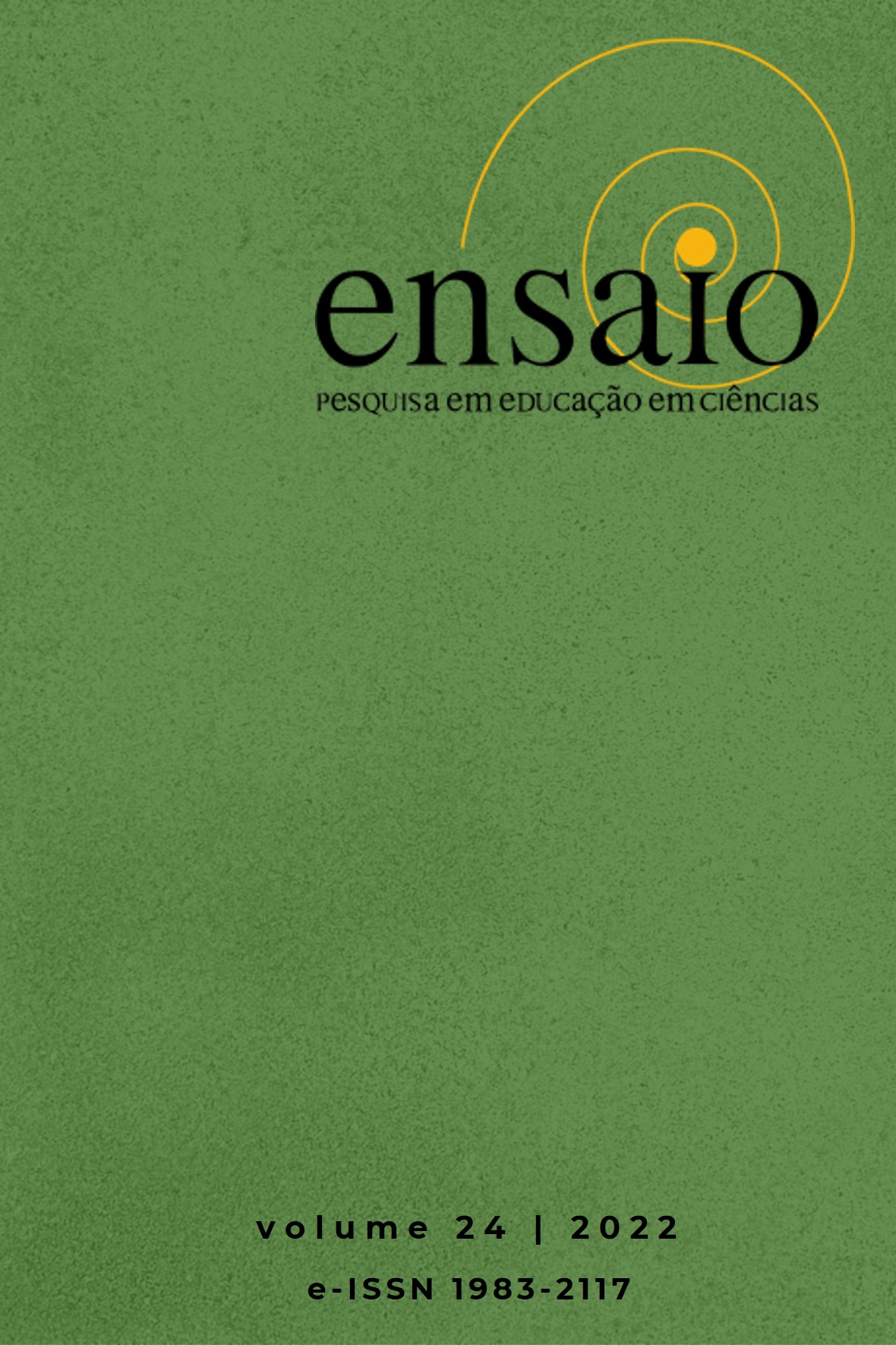LA ASTROBIOLOGÍA EN EL CONTEXTO DE LA ENSEÑANZA DE LAS CIENCIAS EN BRASIL:
VISIONES DE MUNDO DE INVESTIGADORES Y PROFESORES DEL ÁREA
DOI:
https://doi.org/10.1590/1983-21172022240125Palabras clave:
Vida en el Universo, Enseñanza de las ciencias, FenomenologíaResumen
En el marco de una disertación de Maestría, buscamos estructurar comprensiones sobre Astrobiología en el contexto de la enseñanza de las ciencias en Brasil, dada la cosmovisión de investigadores y docentes que actúan en la Educación Básica o Superior en el país. Para ello, se buscó el análisis fenomenológico de los discursos individuales y colectivos de seis colaboradores de investigación, transcritos y descritos a partir de entrevistas grabadas y escritas, para tejer cosmovisiones sobre los elementos que estructuran la astrobiología en el contexto de la enseñanza de las ciencias en Brasil. Con estos movimientos se articularon tres núcleos de ideas, a saber: Potencial para la construcción del conocimiento científico (NI1); Desafíos institucionales, ontológicos y epistemológicos (NI2); Perspectivas y posibilidades en el escenario nacional (NI3). Ciertamente, un campo emergente de la ciencia que exige una perspectiva multidisciplinar presentaría desafíos y obstáculos para insertarse en el contexto de la educación científica brasileña. Sin embargo, no se puede negar que ya existen muchas posibilidades y potencialidades que se pueden explorar en este contexto.
Referencias
Auler, D., & Delizoicov, D. (2001). Alfabetização científico-tecnológica para quê? Ensaio - Pesquisa em Educação em Ciências, 3(1), 1-13.
Barge, L. M., Pulschen, A. A., Emygdio, A. P., Congreve, C., Kishimoto, D. E,, Bendia, A. G., Morais, M., Tele, S. A., Demarines, J., & Stoupin, D. (2013). Life, the universe, and everything: An education outreach proposal to build a traveling astrobiology exhibit. Astrobiology, 13(3), p. 303-308. DOI: 10.1089/ast.2012.0834
Bicudo, M. A. V. (Org.). (2011). Pesquisa Qualitativa segundo a visão fenomenológica. São Paulo: Cortez.
Blumberg, B. S. (2003). The NASA astrobiology institute: early history and organization. Astrobiology, 3(3), p. 463-470.
Brasil, G. S., Oliveira, L. C. V., Almeida, R. R. D., Figueiredo, G. F., & Figeiredo, G. A. (2016). Astrobiologia e vida extraterrestre: transformando cosmovisões no Ensino Médio. In: Anais do III CONEDU, Congresso Nacional de Educação, p. 1-10.
Brasil, Ministério da Educação. (2018). Base Nacional Comum Curricular. Brasília: Ministério da Educação.
Cachapuz, A., Gil-Perez, D., Carvalho, A. M., Praia, J., & Vilches, A. (Org.). (2005). A necessária renovação do ensino de ciências. São Paulo: Cortez.
Carrapiço, F., Lourenço, A., Fernandes, L., & Rodrigues, T. (2001). A journey to the origins. The astrobiology paradigm in education. In Proceedings of SPIE, “Instruments, Methods, and Missions for Astrobiology IV”, San Diego, p. 295-300.
Cockell, C. (2002). Astrobiology - A new opportunity for interdisciplinary thinking. Space Policy, 18(4), p. 263–266.
Ferreira, P. R. A. (2017). Astrobiologia como ferramenta para alfabetização científica e tecnológica. Dissertação (Mestrado) - Instituto de Astronomia, Geofísica e Ciências Atmosféricas, Universidade de São Paulo, São Paulo.
Foster, J. S., & Drew, J. C. (2009). Astrobiology undergraduate education: students’ knowledge and perceptions of the field. Astrobiology, 9(3), p. 325–333.
Friaca, A. C. S., & Janot-Pacheco. (2014). E. Life in the cosmic context. An astrobiology course as an experiment in transdisciplinarity. Revista Mexicana de Astronomía y Astrofísica, 44(1), p. 27-127.
Friaça, A. C. S. (2010). Subjetividade no reconhecimento da vida no Universo. Rev. Brasil. Psicanálise, 44(3), p. 93-101.
Galante, D., Silva, E. P., Rodrigues, F., Horvath, J. E., & Avellar, M. G. B. (2019). Astrobiologia: uma ciência emergente. Núcleo de Pesquisa em Astrobiologia. São Paulo: Editora Livraria da Física.
Langhi, R. & Nardi, R. (2003). Um estudo exploratório para inserção da astronomia na Formação de professores dos anos iniciais do ensino Fundamental. In: Anais do Encontro Nacional de pesquisa em Educação em Ciências, Bauru: ABRAPEC.
Martins, J & Bicudo, M. (1989). A pesquisa qualitativa em psicologia: fundamentos e recursos básicos. São Paulo: Morais.
Neves, M. C. D. (1991). Uma perspectiva fenomenológica para o professor em sua expressão do: “O que é isto, a Ciência”. (Tese de Doutorado), Faculdade de Educação, Universidade Estadual de Campinas.
Paulino-Lima, I. G. (2013). A Institucionalização da Astrobiologia no Brasil e no Mundo. Revista da flora medicinal, 1(42), p. 57-69.
Prather, E. E. & Slater, T. F. (2002). An Online Astrobiology Course for Teachers. Astrobiology, 2(2), p. 17-25.
Quillfeldt, J. A. O SETI e o tamanho do palheiro... Otimismo e pessimismo na busca de nosso alter ego extraterrestre. (2019). In Galante, D., Silva, E. P., Rodrigues, F., Horvath, J. E., & Avellar, M. G. B. (Orgs.). Astrobiologia: uma ciência emergente. Núcleo de Pesquisa em Astrobiologia (pp. 295-316). São Paulo, SP: Editora Livraria da Física.
Rodrigues, T. & Carrapico, F. (2005). Teaching Astrobiology. A Scientific and a Cultural Imperative, SPIE, 5906, p. 59060F-1-59060F-4.
Santos, M., Seabra, O. C. L., Carvalho, M., Leite, J. C. (2000). Território e sociedade: entrevista com Milton Santos. São Paulo: Editora Fundação Perseu Abramo.
Sasseron, L. H. (2015). Alfabetização científica, ensino por investigação e argumentação: relações entre ciências da natureza e escola. Ens. Pesqui. Educ. Ciênc., 17(spe), p. 49-67.
Souza, J. G. (2013). Astrobiologia: obstáculos e possibilidades, a (re)ligação com o Cosmos e o ensino de ciências. Dissertação (Mestrado) – Universidade Estadual Paulista, Faculdade de Ciências, Bauru.
Staley, J. T. (2003). Astrobiology, the transcendent science: the promise of astrobiology as an integrative approach for science and engineering education and research. Curr. Opin. Biotechnol, 14(3), p. 347-54.


